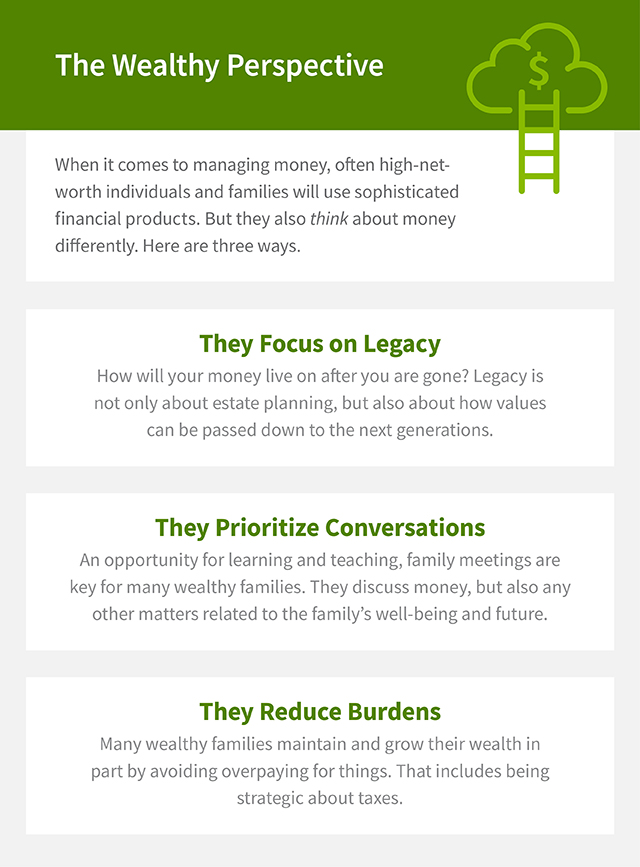Five strategies about managing your money from Wealth Advisors who advise high-net-worth families.
How do wealthy families and investors manage their money? And could the strategies they use help you create your own financial plan? The truth is, whether you have $1,000 or $10 million in net worth, certain money management principles will always be helpful, and many of the tips and strategies that wealthy families use to manage their money could benefit you.
While every individual’s situation is different, any sound financial plan will be based, to begin with, on the answers to a few simple questions: What are your goals and priorities? What are your concerns? What is your timeline to reach your goals?
Keeping that in mind, here are five nearly universal principles on managing your financial life from Dan Blair, Wealth Advisor at Regions Bank in Little Rock, Arkansas, and Joe D. Pierce, Trust Advisor at Regions Bank in Albany, Georgia.
-
Create a Solid Plan
It might sound obvious, but good financial planning begins with a plan. The better the plan, the better your results will be. The process of creating a plan can help you gain clarity on what is important to you. It also provides a structure for you to follow as you work toward goals.
“A plan begins with a clear picture of where you are today as well as your goals––not just your financial goals, but what you want to accomplish with your life,” says Blair. “When designing a financial plan, make sure it’s something you can live with and follow over time.”
“Everyone can benefit from developing a plan to help them achieve their goals, whether it’s a holistic wealth strategy or a simple spending budget,” says Pierce. “Make sure you track your progress and continue to move toward your goals. Modify your plan as necessary, but not too frequently as you don’t want to overreact to short-term events.”
Start by deciding what your short- and long-term goals are. You might want to buy a new TV, which is a short-term goal, or plan to save for a down payment on a home, which is a long-term one. Then create a budget that will help you work toward those goals.
-
Use Time to Your Advantage
Plans are most successful when they are constructed well in advance of a goal. The more time you have, the better your chances of success. Conversely, the closer you are to an event or a goal, the fewer options you have. This is particularly true when it comes to retirement planning and investing.
“Time is your best friend, until it isn’t,” says Pierce. “So take advantage of it while you can. The longer you can contribute to a tax-advantaged retirement account such as a 401(k) or IRA, and not withdraw any funds, the greater the benefit you’ll receive from compound growth over time.”
In the case of retirement investing, a longer time horizon can also allow people to invest more aggressively. That means more money allocated to stocks and other assets with the potential for higher returns. To learn more about diversification and time horizon, read this.

-
Keep Emotions in Check
Emotions should never drive your financial decisions, but all too often they do. Emotional reactions often lead to impulse decisions that can quickly diminish the effectiveness of a well-constructed financial plan.
“When a plan is properly designed, it serves as a reminder to not act on impulse because the plan was intended to withstand these specific types of situations,” Pierce says.
So the key is to be logical and thoughtful when creating a plan and try to give proper consideration to adverse events that could potentially derail it. Anticipate and prepare for those obstacles, such as a volatile stock market or a recession, by creating your plan in a way that these factors do not prevent you from reaching your goals.
One of the things you should consider is how much risk you are comfortable with. We all know risk can result in reward, but inherently, risk can also lead to loss. There is no reason to take even the slightest amount of additional risk than tolerable. Wealthy investors know exactly how much risk they can live with.
-
Communicate Well
Communication is a critical part of financial planning. When the plan involves the eventual distribution of assets to others, such as your children, it’s always best to clearly express your intentions well in advance.
Communication can also be helpful in terms of holding you accountable. For example, if you want help with staying on track toward your goals, you could work with a financial advisor who can provide guidance, discipline and structure. More informally, people can often benefit from support from a spouse or a friend.
To help you kick-start your financial plan, consider visiting a Regions Bank branch and talking with a banker. They can create a Greenprint Personalized Financial Plan for you.
-
Apply These Four Principles to an Estate Plan
Contrary to many people’s belief, everyone can benefit from an estate plan. Estate plans detail what should happen to your assets and money after you are gone. They include your will and other documents and directives.
“You don’t need an excessive amount of wealth for estate planning to be of value,” says Pierce. “If you have a spouse and/or have children, you’ll benefit from having key documents in place, including a will, a financial power of attorney and a health-care power of attorney.”
This is where planning far in advance and communicating those plans well can make an enormous difference.
Blair worked with a business owner who was ready to retire. “The couple wanted to sell the business to one of their four children,” he recounts. “They asked critical questions: ‘Does each child have the passion? Do they enjoy the business? Are they willing to work hard enough to succeed as we have?’”
That process eliminated all but one of the children, leading to a clear conclusion.
In many other cases involving estate planning, clearly communicating how the assets will be transferred to the next generation can avoid countless potential problems and emotional battles down the road. Instead of assuming that a child would want or be able to manage a business, for example, it’s far better to hear from them and work with the eventual successor in advance and groom them to succeed.
Even in the simplest cases, planning well in advance, building a logical plan and communicating it well are keys to long-term financial success.
Three Things to Do
- Visit a Regions Bank branch and talk to a banker about creating a Greenprint.
- Think about your financial goals, and then write them down. You might start with reducing debt and creating a budget.
- Read more about how wealthy families manage their money on our Wealth Insights channel.










